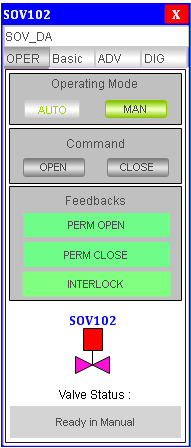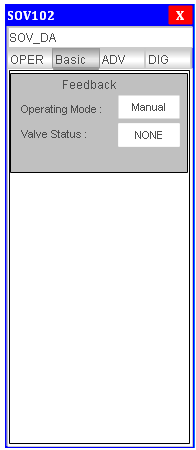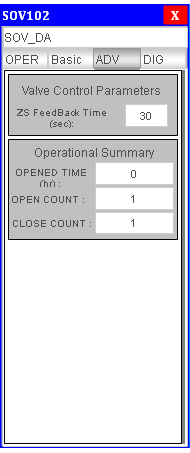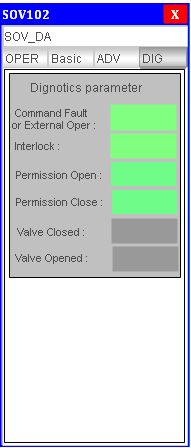SOV (Dual Acting) Block Documentation
Overview
The SOV (Dual Acting) block represents a solenoid valve actuator controlled in both open and close directions. This block provides visual indications, status feedback, and control options across four levels of operation — Operator, Basic, Advanced, and Diagnostic.
Users can interact with the block via:
- Block Icon on the HMI
- Faceplates that expand below upon selection
- Pins for input/output signal wiring in logic
Block Icon
The SOV-DA block icon is implemented in contexts where a straightforward indication and a cautionary visual representation are required. The block icon image is given below for reference:
The block icon is dynamic, meaning the color of the icon changes when different alarms are activated:
-
SOV in Close Condition

-
SOV in Open Condition

-
SOV is Opening: ZSO not received


- SOV is Closing: ZSC not received


Note: On Clicking the SOV-DA block icon, the corresponding faceplate below will be displayed.
Block Icon Behavior
On clicking the SOV Block Icon:
- The corresponding faceplate will automatically open.
- The icon shows real-time color indicators (open, closed, moving, or fault).
- The tag number associated with the valve is shown for easy identification.
Pro Tip: Users can view real-time feedback by hovering or clicking on the block icon in runtime view.
Faceplate Tabs
Operator Level Tab
On clicking the Oper button, the Operator Tab will open.
Only authorized users can access this after logging in.

Operating Mode
- AUTO: Automatic operation from logic
- MAN: Manual override for user control
After selecting MAN, the operator can manually control the SOV.
Command (Available only in MAN mode)
- OPEN: Activates
CMD_OPENpin - CLOSE: Activates
CMD_CLOSEpin
Feedbacks
| Feedback Item | Condition | Status Indicator |
|---|---|---|
| PERM OPEN | If open permission is OK | 🟢 = Open Permission OK 🔴 = Open Permission Not OK |
| PERM CLOSE | If close permission is OK | 🟢 = Close Permission OK 🔴 = Close Permission Not OK |
| INTERLOCK | If interlock condition is satisfied | 🟢 = Interlock OK 🔴 = Interlock Active |
| SOV BLOCK ICON | Shows the Solenoid Valve block icon with tag number. | Displayed as graphical block with tag ID |
| Status | Displays the current status of the SOV (Open / Close / Running). |
Basic Level Tab
On clicking the Basic button, the Basic Tab will open.
Only authorized users can access this after logging in.

Feedback
- Operating Mode: Displays MANUAL or AUTO
- Valve Status: Shows OPENED or CLOSED based on ZSC/ZSO pins
Advance Level Tab
On clicking the Adva button, the Adva Tab will open.
Only authorized users can access this after logging in.

Valve Control Parameters
- ZS Feedback Time (sec): Time to receive ZSC / ZSO feedback
Operational Summary
- OPENED TIME (hr): Total valve opened time
- OPEN COUNT: Total valve open operations
- CLOSE COUNT: Total valve close operations
Diagnostic Level Tab
On clicking the Diag button, the Diagnostic Tab will open.
Only authorized users can access this after logging in.

Diagnostic Parameters
| Feedback Item | Condition | Status Indicator |
|---|---|---|
| CMD Fault | Command fault or externally operated. | 🟢 = Everything OK 🔴 = Fault is Available |
| INTERLOCK | Interlock condition status. | 🟢 = No Interlock 🔴 = Interlock Available |
| PERM OPEN | Open permission status. | 🟢 = Open Permission Satisfied 🔴 = Not Satisfied |
| PERM CLOSE | Close permission status. | 🟢 = Close Permission Satisfied 🔴 = Not Satisfied |
| ZSC | Closed feedback status. | 🟢 = Closed Feedback Received 🔴 = Not Received |
| ZSO | Open feedback status. | 🟢 = Open Feedback Received 🔴 = Not Received |
This SOV(Dual Acting) faceplate structure ensures full control and monitoring at both operator and supervisor levels.
Best Practices
- Always check PERM signals and INTERLOCK before switching to manual mode.
- Use Diagnostic tab for troubleshooting missing feedback or fault conditions.
- Set appropriate feedback timeout in logic to avoid false fault triggers.